Business Industry Capital
|

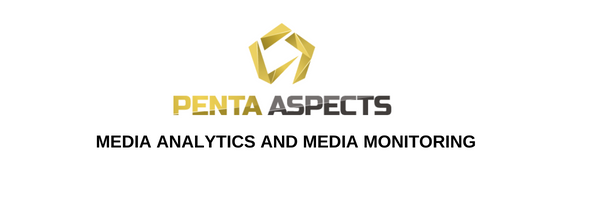

|
Bulgaria
|
|  | |
|
BNB Exchange Rates
(05.03.2026) |
|---|
| |
GBP |
|
1.14880 |
|
| USD |
|
0.85840 |
| CHF |
|
1.10110 |
| EUR/USD |
|
1.1649* |
|
ECB exchange rate |
|
Basic Interest Rate |
| |
as of 01.12 |
|
1.81% |
|
|
|
 |
Financial news |
 |
From January 1, 2027, Bulgaria will officially be divided into four new statistical regions at NUTS 2 level. Thus, Sofia will stop casting a shadow over the municipalities in the South-West region, with Pernik and Kyustendil now having access to more European funds. The change comes into force after the NSI approved for Bulgaria the updated Classification of Territorial Units for Statistical Purposes (NUTS 2027), adopted by the European Commission. The division of Bulgaria into certain regions is not only important for statistics, but also for access to European funds. The percentage of European funding under the various programs, part of the EU cohesion policy, depends on the economic and demographic indicators of each region. The basis of the EU cohesion policy is the Gross Domestic Product (GDP) per capita. Regions whose economic development is below 75% of the EU average are classified as "less developed" and receive the highest level of grant aid. Until now, Sofia was part of the South-West region together with districts such as Pernik, Kyustendil and Blagoevgrad. The strong economic standard of the capital artificially raised the average indicators of the entire region. This put neighboring districts such as Pernik and Kyustendil in statistical traps, which risked being deprived of high subsidies, since on paper they appear “rich” due to their proximity to Sofia. The six regions at the NUTS 2 level (South-West, South-Central, South-East, North-East, North-Central and North-West) were established in 2000, and in 2007 they were slightly changed due to a Eurostat requirement for territorial units within the European Union, according to which a region must have a minimum of 800 thousand and a maximum of 3 million inhabitants. The new zoning provides for the consolidation of the previous six regions into four large-scale units:
Northern region: Unites the districts from Vidin to Silistra (11 districts). The goal is to stop the demographic decline through targeted investments in Northern Bulgaria;
Eastern Region: Includes the Black Sea coast, Shumen, Sliven and Yambol. The focus here will be on the "blue economy" and industrial development;
Southern Region: A large region including Plovdiv, Stara Zagora and the districts of Southwestern Bulgaria (excluding the capital). This allows Pernik and Kyustendil to finally step out of the shadow of the Sofia standard;
Capital Region: Sofia-city is being established as an independent unit. As a "developed region", it will have a different funding regime, but will not "prevent" the other districts from receiving the maximum from the Cohesion Fund.
From the end of February 2026, the responsible units must implement the new classification in: the National Register of Settlements, the Information System "Statistical Classifications", the Open Data Portal and the Bulgarian National Bank (BNB). This technical synchronization must be completed by August 2026. It is critical so that in January 2027, when the new map comes into force, the state has a correct statistical basis on which to negotiate budgets for the period 2028 - 2034. Source: economic.bg
The Bulgarian National Bank (BNB) has published the average amount of fees as of December 31, 2025, charged by banks to current account users for the services under Annex 1 to Regulation 3 of the BNB, in connection with the determination of acceptable fees for payment accounts for basic transactions. For opening a current account at a bank office, the average amount of the fee is 2.55 euros (4.99 leva), and for opening a current account at a bank office with the issuance of a debit card - 2.08 euros (4.07 leva). For servicing a current account at a bank office, the average amount of the fee is 2.18 euros (4.27 leva) per month. For servicing a current account at a bank office with a debit card issued to the account, the average amount of the fee is 1.26 euros (2.47 leva) per month. For closing a current account in an office, opened within 6 months from the date of closure, the average fee is 1.74 euros (3.41 leva). Source: Company information
 |
Companies |
 |
The ten largest enterprises in the mining industry ended 2024 with minimal growth in total revenues. While mining companies as a whole increased their revenues, the extraction of non-metallic minerals had a more difficult year. The decline in coal also continues. Profits in the sector are increasing, with almost all companies reporting positive results. The only exception is again in coal - the state-owned "Mini Maritsa-Iztok", which practically doubles its loss. Overall, the profitability of the largest in the sector is improving, reaching nearly 21.5% in 2024 compared to 16.7% in the previous year. Total employees decreased slightly (-3%), mainly due to the decrease at "Varba - Batantsi", but there are no sharp changes in personnel in general. "DPM Chelopech" comes out on top with significant growth in 2024. The company also reports the highest profit and profitability in the sector. Due to the second year of strong decline in revenue, "RUA Bulgaria" falls to 10th position. According to the report of the Bulgarian Mining and Geological Chamber, the decline in coal production continues in 2024, with the decrease being 29% in just one year, and almost 60% in the last two years in total. The reason for this is Europe's climate policies to limit fossil fuels for electricity production. Ore production also decreases in 2024 - by 3%, but higher metal prices compensate for the lower volumes. Therefore, the value of metal mineral production is up in 2024. Overall, the trend of total production in the industry growing steadily by about 5% per year continues. The leader in the sector in 2024 is "DPM Chelopech" (formerly "Dundee Precious Metals Chelopech"), which extracts copper-gold ores. The company's revenue increased by 39% to over 400 million euros. Profit doubled, and profitability reached 49.3% (31.6% for 2023). In 2024, the company reported more sales and higher metal prices, which explains the excellent results. Further down the ranking - in 5th place - is the other company of the Canadian DPM Metals - the gold mining company "DPM Krumovgrad", which in 2024 reduced its revenue by 9% due to lower sales of concentrate from the "Ada Tepe" mine. However, the company maintains high profitability - 47.5%, which is the second best result in the sector after that of the company in Chelopech. According to the report of DPM Metal, which is a public company, in 2025 both companies continue to increase their revenues - in Chelopech they increased by 57%, and in Krumovgrad - by 14%. The main driver remains the higher prices of metals, and in the case of the Chelopech mine - also the larger sales volumes. The two leading companies from the previous ranking - the copper miners "Asarel-Medet" and "Elatsite Med", are retreating by one position. Both also increase their revenues, but at a more moderate pace. Panagyurishte's "Asarel-Medet" maintains the quantities of mined and processed ore, but achieves a high indicator of copper extraction - nearly 92.5%. It is this improved efficiency that is behind the 1.8% revenue growth. In 2024, the company invested 67 million euros in its seven programs for long-term sustainable development, with another 80 million euros planned for 2025, according to the report. Increased copper prices are also behind the 6.6% revenue growth of Elatsite Med, which operates the deposit near Etropole. The company reports a minimal decline in the amount of processed ore. Profit is increasing, as is profitability - from 24% in 2023 to nearly 30% in 2024. In March 2025, the company's concession was extended by 10 years until 2041. The revenues of the producers of lead-zinc ores - "Varba - Batantsi" and its subsidiary "Gorubso - Madan" are also higher, with the former's result being over a quarter higher than in 2023. Both companies are part of the KCM group and supply concentrate to the plant in Plovdiv. The average annual results show a nearly 12% decrease in the staff of "Varba - Batantsi" to 127 people. However, data from APIS indicate that there was a temporary decrease in employment, while in 2025 the number of workers increased again to 144 people. The remaining four companies in the ranking, which do not extract metal raw materials, are reducing their results in 2024. The revenues of the state-owned coal mining company "Mini Maritsa-Iztok" are shrinking by more than a fifth, which for the second year in a row significantly worsens its performance. The mines supply coal to the coal mines in the Maritsa Basin. In 2024, the company extracted almost 30% less coal. At the end of February, the contract with one of the major customers - "ContourGlobal Maritsa-Iztok 3" - expired, in connection with the end of the agreement for the mandatory purchase of energy from the plant by NEK. The revenues of the state-owned coal mining company "Mines Maritsa-Iztok" have shrunk by more than a fifth, which has significantly worsened its performance for the second year in a row. For the first nine months of 2025, the total revenues of the state-owned mines increased by 34% to 131.9 million euros, but their loss doubled to 107.4 million euros. Coal supplies to the state-owned TPP "Maritsa-Iztok 2", "Brikel" and "AES Galabovo" have increased. However, the latter company's contract with NEK for the purchase of energy expires this year, which will affect the mines. Producers of non-metallic minerals and raw materials are also down. "Kaolin", which is owned by the German Quarzwerke International and has several deposits for the extraction of kaolin, quartz sand and other industrial raw materials, has reduced its revenues by over 12%. Profits also decreased slightly. The report makes it clear that this is the result of the decline in sales. About half of the revenue comes from sales in the country. The revenue of "Ognyanovo K", which extracts inert materials and produces lime for construction and industry, is also over 9% lower. However, the profit is doubling. The company, whose ultimate owner is the Swedish Plena Holdings, has two plants in the country - "Ognyanovo" near Pazardzhik and "Puklina" near Slivnitsa. According to its report for 2025, 2.9 million euros of investments are planned, including own funds and a bank loan. The most significant decrease is at "RUA Bulgaria" of the Ukrainian Viktor Demyanyuk, which processes mining waste. The company reports a more than 50% drop in revenue for the second consecutive year. "RUA Bulgaria" has a factory for the production of iron and barite concentrate in "Kremikovtsi", and practically all of its clients are abroad. Over the past few years, the company has invested mainly in a barite bleaching and gypsum production plant, for which 2.2 million euros have been allocated in 2024. One of the world’s largest data center companies, Digital Realty, has announced its entry into the Bulgarian market through the acquisition of Sofia-based leading local provider Telepoint. With the acquisition, Digital Realty adds two new data centers in the Bulgarian capital to its portfolio, which already includes over 300 sites and more than 500 available cloud solutions worldwide. One of the newly acquired sites is among the most highly interconnected in Southeastern Europe – with over 110 unique network service providers and multiple cloud installations. Sofia is home to over 340 network points of presence and nearly 200 unique networks, which ranks it among the leading markets in Southeastern Europe in terms of international internet speed and traffic growth. It offers carrier-neutral connectivity to the EU, Turkey and the Caucasus region. An additional strategic factor is Sofia’s role as a distribution hub for traffic from new submarine cable systems reaching Greece. Growing volumes of data from the Middle East and Asia are being redirected overland to the Bulgarian capital, cementing its position as one of the key European gateways to these regions. The acquisition complements Digital Realty’s existing presence in the region – the company already operates sites in Athens, Heraklion and Zagreb. The addition of Sofia forms a dense network covering the connectivity corridor in the Eastern Mediterranean and the Balkans. In the context of the accelerated deployment of artificial intelligence in Europe and the Middle East, Sofia’s strategic location on key land and underwater routes makes it a vital hub for AI infrastructure. Proximity to end users reduces latency in inference – the process by which trained AI models process new data in real time to generate results. The news of Digital Realty’s acquisition of Telepoint comes at a time when the global internet architecture is undergoing a historic transformation. Source: economic.bg
Ruse-based euShipments.com announced the expansion of its operations with the opening of new own bases in Italy and Spain, where until now its operations were carried out through local integrated partners - subcontractors. The company provides fulfillment and logistics services for online stores selling abroad, and with the new locations, the total volume of its warehouse space increases by over a third compared to the previous over 40,000 sq m. The step comes after the Austrian Post (Österreichische Post) entered the business as a strategic investor at the end of 2025, acquiring 70% of the shares of "EUShipments.com" for about 55 million euros, and the private equity fund BlackPeak Capital sold its entire stake of just under 39%. Until now, euShipments.com, established in 2012, had seven of its own warehouses with a total area of over 40,000 sq m in six countries - two in Bulgaria (in Ruse and Sofia) and one each in Romania, Croatia, Slovenia, Hungary, Slovakia. Of these, the company operates about 30 route lines, covering territories from Poland to Cyprus, and in the final destinations it partners with over 60 courier companies that deliver the shipments to the end users. By the end of 2025, its consolidated revenues are nearly 51 million euros, and its employees - over 400. With its new warehouses in Italy and Spain, which are already fully functional and working with the first customers with goods stored there, the group directly takes over the management of the quality, speed and flexibility of services in these two countries, as well as in the Portuguese market, which will also be served by the warehouse in Spain. The warehouse in Italy is located in a strategic location - the northern city of Bolzano, near the Brenner Pass, which is one of the most important transport routes between Italy and Austria. The activity there begins on an area of 2,000 sq m with 500 pallet spaces and separate areas for fulfillment and cross-docking processes, and the company specifies that the area has been agreed to increase to 10,000 sq m. The warehouse has an automated conveyor system for processing shipments that scans, measures and registers each shipment in real time, minimizing the risk of human error. Among the key features of the location is that the new center, which will deliver shipments in partnership with regional leaders Poste Italiane, GLS, BRT, is located less than a kilometer from the depots of local courier companies. The other new warehouse is significantly larger - with an operational area of 13,500 sq m. It is located in Barcelona and is described by the company as a fulfillment center for scaling - with the ability to store up to 23,000 pallet spaces and 15,000 picking locations. The hub is equipped with a high-bay pallet system that allows for optimal use of vertical space, and its operations are integrated with the most preferred local couriers - Correos and CTT Express, providing next-day deliveries in both Spain and Portugal. The center currently has the capacity to fulfill over 10,000 online orders per day, making it a logistical backbone for online brands with an aggressive growth policy and strongly expressed peak sales periods. By the end of the first half of 2026, three more markets are expected to be added. One is part of the so-called DACH region (Germany, Austria, Switzerland), and the other two are some of the fastest growing e-commerce markets in Europe outside the EU. The chocolate manufacturer Melbon AD plans to significantly expand its production capacity by building a new base in Pernik. The project, submitted for approval to the Regional Inspectorate for Environmental Protection and Water Management-Sofia, involves the construction of a specialized building for the production of chocolate and couverture masses in the Crystal district. It will be an addition to the company's factory, which is located in the same place. The investment will be implemented on the company's own property with the identifier UPI XXVIII-502.2054 in district 471. The land has a permanent purpose for an urbanized territory and falls into the development zone "Pp" (production zone). The development parameters provide for high intensity - an intensity coefficient (Kint) between 1.0 and 2.5, a building density of 40 to 80% and a maximum cornice height of 25 meters. The landscaping on the property will occupy between 20% and 40% of the area. The new enterprise will operate with a fully automated assembly line for the production of chocolate blanks. The building will have three main areas: a production hall, a raw material warehouse and a service area with living quarters for the staff. It is planned that two people will work full-time at the site, who will manage the processes through an air-conditioned control cell with computer control. The technological process in the new enterprise is organized in a closed cycle, which begins with the receipt of the basic raw materials - milk powder, butter and cocoa. Initially, the butter and cocoa mass are liquefied in specialized melters, after which they move on to the grinding stage. There, the raw materials are first roughly processed in a two-roll mill, and immediately after that they are subjected to fine refining in a five-roll apparatus. The next stage is conching, which lasts six hours, during which time the remaining amount of butter is added to the mixture to achieve optimal consistency. At the end of the cycle, the finished chocolate mass is pumped into large collection tanks, from which it is fed directly to the production lines for the production of the final products via an automated pipeline system. Melbon AD was established in 1999 with its headquarters and management address in Sofia, 194 Simeonovsko Shosse Blvd. The main activity of the company is the production and sale of high-quality chocolate and confectionery products, using raw materials from the country and abroad for the needs of production. The company is a "parent" enterprise and owns 100% of the capital of Melbon Toys EOOD. For 2023, Melbon AD reports a current profit of 1.2 million euros (2.4 million leva) Source: economic.bg
The Bulgarian company Ecomaat has announced a significant breakthrough in the development of natural cosmetic ingredients. An innovative extract of fresh lilac flowers has shown impressive results in an independent scientific study, the domestic manufacturer of organic certified products reports. The data confirm a serious improvement and regulation of skin hydration without disrupting its outer protective layer. This is the second key scientific breakthrough for Bulgaria within the framework of the large-scale European project InnCoCell. An earlier study of sage extract, also produced by Ecomaat, showed significant potential in the fight against photoaging of the skin. Funded under the European research and innovation program "Horizon 2020", the initiative brings together 17 partners from 15 European countries and aims to revolutionize the way natural components for cosmetics are produced and validated. As part of the study, the lilac extract (Syringa vulgaris), extracted using supercritical carbon dioxide technology, was analyzed by the German leader in industrial raw materials Merck Electronics KGaA. The results are of particular importance for Bulgaria, which has a long tradition of working with lilac. The lipophilic structure of the extract, obtained through supercritical CO₂ extraction, makes it suitable for use in all types of cosmetic products, but its greatest potential is in facial skin care. Source: Darik radio
Canadian Maple Bear School Opens Near Plovdiv in Autumn In the nearby Plovdiv village of Markovo, a new educational institution that will be part of the Maple Bear franchise chain - the third in the country and the first outside the capital - will open in September with two preschool groups - for 5- and 6-year-olds, and one first grade for the 2026-2027 school year. The franchisee is the company "Private Primary School Canadian Bears - Plovdiv", which is solely owned by Bodukov. The school is located on a property spanning 1,500 sq m of built-up area. An existing building will be rented, and activities are already underway to transform it into an educational institution according to Bulgarian and Canadian educational requirements, which are expected to be completed within a few months. The initial team is planned to be about a dozen people, including teachers and administration. Annual fees will be about 10 thousand euros, including training, food, textbooks and additional activities The Pazardzhik battery manufacturer "Elhim-Iskra" is stopping work and will start laying off nearly 200 workers. The decision was made at a meeting of the board of directors on Wednesday, March 4, with the plant scheduled to stop working on March 23, and 20 days later the company will take action to terminate the contracts of workers and employees. The management is developing a strategy for restructuring the activity, but no further details have been announced. The difficulties of "Elhim-Iskra" are the result of a combination of factors, including the loss of market positions in Italy and Germany due to the reduced industrial production there and the competition from manufacturers from Turkey, China and India, which have significantly lower labor and energy costs. The company points to the high prices of electricity in Bulgaria and Europe and the lack of a real compensation mechanism for state support as a problem. Currently, there is practically no operating mechanism in the country to cover part of the electricity costs of manufacturing enterprises. The company also complains about the administratively imposed annual increase in the minimum wage and the lack of qualified personnel, which requires a constant increase in labor costs, without any increase in productivity. Last year, Elchim-Iskra reduced its revenues by 7% to 15.4 million euros and remains at a loss, although decreasing (0.5 million euros). Wiser Technology reports annual revenues of EUR 39.2 million compared to EUR 20.5 million in 2024. The increase is due to both the inclusion of the results of the companies acquired in 2024 and 18% organic revenue growth. For 2025, the company has an operating net loss of EUR 1.4 million compared to EUR 1.3 million for the nine months of the year. In the fourth quarter, the company introduced changes to its accounting policies in order to increase transparency and limit balance sheet risk. As a result, the reported annual net loss amounted to EUR 4.3 million. Among the measures taken is the introduction of a policy for writing off receivables with a term of more than 180 days, which led to a non-cash adjustment of EUR 1.68 million. All affected receivables originated before last year, with 73% of them predating the acquisitions in 2024 and inherited from one of the acquired companies. The company also updated its policy for recognizing sales commissions, with contingent commissions now recognized at the time of sale, regardless of whether the conditions to them are met. For 25 years, Wiser Technology has been creating software that helps global organizations design, implement and develop their AI solutions. The Code – its execution model, unites strategy, architecture, engineering and training of teams in a consistent process from idea to real application. Wiser works in Europe, the Middle East and North America, partnering with global leaders in the automotive industry, aviation and defense, telecommunications and media, information technology and financial sectors. Source: Banker
|
|
Investments
|
|  |
|
|
 |
 Sofia Region Sofia Region
- Active production facility
- 3100 sq. m of production, warehouse, and administrative space
- Separate showroom
- Suitable for furniture manufacturing or other light industry
- Excellent accessibility and infrastructure
- Quick commissioning / immediate production
- Potential for optimization and expansion
|
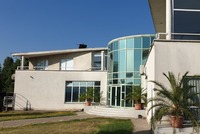 |
 Sofia Sofia
Operating enterprise with excellent financial results, 14.6 decares total area with excellent location, 3 halls (total area 1600 sq.m and height 11 m), cranes for loading and unloading activities (lifting capacity 13 t), admin. building (360 sq.m), warehouses and active store
|
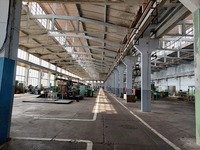 |
 Pleven Region Pleven Region
Total area 34 decares, 2 halls (total area 8510 sq.m) and admin. building (3 floors, GFA 2217 sq.m), operating business, good location, cranes for loading and unloading (lifting capacity 2x1 t, 3, 5, and 12 t), electrical connection - 110/20 kV with two underground 20 kV power lines, substation
|
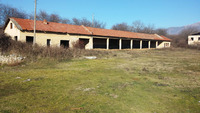 |
 Kocherinovo municipality (Kustendil region) Kocherinovo municipality (Kustendil region)
Area: 13,657 sq.m consolidated land, with the possibility of changing the status of the parcel for another type of industrial activity.
|
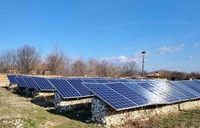 |
 Municipalities: Chirpan, Bratya Daskalovi, Brezovo, Panagyurishte, and Parvomay Municipalities: Chirpan, Bratya Daskalovi, Brezovo, Panagyurishte, and Parvomay
Total area: about 40 decares of owned land in the regions of Plovdiv and Stara Zagora, 29 installed PV plants, each with a capacity of 29,700 Wp, 3 additional properties with development potential
|
|
|
Bulgarian Industrial Association
|
|  |
|
World
|
|  |
 |
Europe |
 |
Bulgaria is the country with the lowest unemployment rate in the eurozone in January 2026, according to the latest seasonally adjusted data from Eurostat, the statistical office of the European Union. Unemployment in Bulgaria was at a level of 3.1 percent, which is the lowest of all countries in the entire European Monetary Union. It should be borne in mind that the population (and especially the working-age population aged 15–64) in Bulgaria decreased by 800 thousand people for the period 2003-2013 due to aging, emigration and negative natural growth, as a result of which the number of active job seekers objectively decreased. The seasonally adjusted unemployment rate in the eurozone amounted to 6.1 percent in January 2026, which is a decrease compared to 6.2 percent in December 2025 and 6.3 percent a year earlier. For the EU, the indicator reaches 5.8 percent, compared to 5.9 percent in the previous month and 6.0 percent in January 2025. According to Eurostat, a total of 12.928 million people in the EU were unemployed in January, of which 10.770 million in the euro area. On a monthly basis, the number of unemployed decreased by 185,000 people in the EU and by 184,000 people in the euro area. On an annual basis, the decrease amounts to 274,000 people in the EU and 273,000 people in the euro area, respectively. After Bulgaria, the lowest unemployment rate in the euro area is in Malta (3.4 percent) and Slovenia (3.9 percent). The highest unemployment in the currency union is in Finland (10 percent), Spain (9.8 percent), as well as in France and Greece (7.7 percent). In January 2026, 2.922 million young people under 25 were unemployed in the EU, 2.352 million of them in the euro area. The youth unemployment rate in the EU was 15.1%, down slightly from 15.2% in December 2025. In the euro area, the rate was 14.8%, down from 15.0% a month earlier. Compared to December 2025, the number of unemployed young people decreased by 27,000 in both the EU and the euro area. On an annual basis, youth unemployment decreased by 27,000 in the EU, while in the euro area it increased by 12,000.
Source: actualno.com
 |
America |
 |
World grain production has surpassed 3 billion tons, a historic record. Wheat prices have risen from between 3 and 4.25 euros/ton to around 200 euros/ton, according to global agencies. The latest forecasts from the Food and Agriculture Organization (FAO) show that food inflation will vary significantly in 160 countries by 2026, from double-digit increases in some economies to actual price declines in others. High inflationary pressures, i.e. The largest increase in food expenditure is expected to be in developing economies and import-dependent countries. The dynamics of food inflation are influenced by currency fluctuations, world commodity prices, trade tensions and domestic supply conditions. According to the forecast, the world wheat harvest in 2025-2026 will reach a total of 834.71 million tons, which is a growth of 4.54%. At the moment, the grain market in Bulgaria is stable and without major fluctuations. In 2025, however, exports from the EC fell by 44% on an annual basis. Against this background, pressure from Brussels and low prices are hitting the grain business in our country. In September last year, Bulgarian grain producers united to discuss new agreements between Brussels, MEPCOCUR (a trade organization that includes Brazil, Argentina, Paraguay and Uruguay) and Mexico, which are hitting European, and in particular Bulgarian, business.
 |
Asia |
 |
Due to the war in Iran, the Strait of Hormuz is effectively closed, and shipping through the strategic sea route has almost completely stopped. The strait is one of the most important routes for the world's oil and liquefied natural gas exports, writes the German business publication En Te Fau in its analysis. The Strait of Hormuz connects the Persian Gulf with the Gulf of Oman and the Arabian Sea. At its narrowest point, it is about 33 kilometers wide, and the shipping corridors in each direction are approximately three kilometers. Oil exports from key producers such as Saudi Arabia, Iraq, Kuwait, Qatar, Bahrain and the United Arab Emirates are carried out through it. The Iranian Revolutionary Guard announced a blockade of the strait after the start of the US-Israeli attacks on the country. Almost a fifth of the world's oil consumption passes through the Strait of Hormuz. According to data from the analytical company Vortexa, last year an average of over 20 million barrels of crude oil were transported through it daily. About 20 percent of the world's liquefied natural gas trade also passes through this route, with Qatar exporting almost all of its liquefied gas this way. Alternative routes are limited. There are pipelines through Saudi Arabia to the Red Sea and from the United Arab Emirates to the Gulf of Oman, but according to the International Energy Agency, they can handle only about a quarter of the usual volume that leaves the region by sea. Iran has no alternative route outside the strait. The International Energy Agency warns that any prolonged disruption to flows through the Strait of Hormuz would have serious consequences for global oil markets. Since the conflict began, oil prices have already risen by about 11 percent. Analysts warn that a possible prolonged closure of the Strait of Hormuz would affect Asian economies to varying degrees depending on their dependence on energy imports and supplies from the Persian Gulf, CNBC also writes. In a note, investment bank Nomura said Thailand, India, South Korea and the Philippines are among the most vulnerable because of their high dependence on oil imports, while Malaysia could be relatively less affected as a net energy exporter. According to Kpler, Qatar and the United Arab Emirates provide 99 percent of Pakistan’s liquefied natural gas (LNG) imports, 72 percent of Bangladesh’s and 53 percent of India’s. Analysts say Pakistan and Bangladesh have limited storage and supply diversification capabilities, making them particularly vulnerable to disruptions. Bangladesh already has a structural gas deficit of more than 1.3 billion cubic feet per day, according to the Institute for Energy Economics and Financial Analysis. India is at significant risk because more than half of its LNG imports come from the Persian Gulf and many contracts are indexed to Brent. UBP estimates that about 60 percent of India’s oil imports also come from the Middle East, meaning a prolonged blockade would push up energy costs and put pressure on the current account. China is the world’s largest crude oil importer and buys more than 80 percent of Iranian oil, according to Kpler. About 40 percent of its oil imports and 30 percent of its LNG imports pass through the Strait of Hormuz. Analysts note that the country has larger buffers. LNG stocks stood at about 7.6 million tons at the end of February, providing short-term coverage. A longer disruption could see China shift demand to Atlantic supplies, which would intensify price competition in Asia. The Middle East supplies about 75 percent of Japan’s oil imports and 70 percent of South Korea’s, according to UBP. Their exposure to LNG from the Persian Gulf is lower – about 14 percent for South Korea and 6 percent for Japan. Stocks are limited – about 3.5 million tons of LNG for South Korea and 4.4 million tons for Japan, covering between two and four weeks of consumption. According to Nomura, South Korea’s net oil imports are about 2.7 percent of GDP, increasing the vulnerability of the current account to a price shock. In Southeast Asia, the main effect is expected to be in the form of higher inflation, rather than an immediate shortage. Countries that rely on the spot market for LNG will face higher costs if competition with Europe for supplies intensifies. pariteni.bg 
|
|
Indexes of Stock Exchanges
04.03.2026 |
| Dow Jones Industrial |
| 48 557.70 |
(-193.30) |
| Nasdaq Composite |
| 22 807.50 |
(290.79) |
Commodity exchanges
04.03.2026 |
|---|
| |
Commodity |
Price |
|
| Light crude ($US/bbl.) | 76.96 |
| Heating oil ($US/gal.) | 3.4950 |
| Natural gas ($US/mmbtu) | 3.0073 |
| Unleaded gas ($US/gal.) | 2.6552 |
| Gold ($US/Troy Oz.) | 5 159.01 |
| Silver ($US/Troy Oz.) | 83.60 |
| Platinum ($US/Troy Oz.) | 2 166.72 |
| Hogs (cents/lb.) | 104.25 |
| Live cattle (cents/lb.) | 23 771.50 |
|
|
 |
Golyamo Bukovo Monastery |
 |
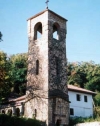
The Monastery St. Zhivorpriemnii iztochnik (Life-giving Source) is located 4 km eastern from the village of Golyamo Bukovo and is the only monastery survived in Strandja Mountain. It was built in 1887. The holy spring Zhivorpriemnii iztochnik is located in the temple’s altar. The monastery is declared a monument of culture. According to the legend, and the historians too, at the place of the today’s monastery a temple has one existed that was built over the ruins of an ancient sanctuary. Some people believe that the Paroria monastery of Grigorii Sinait and the Hesychasm school. The today’s monastery church was built by the Master Kolyu Minev from Tryavna. The columns in the basilica were brought from the ancient ruins near Debelt. The monastery is acting, and celebrates the its patron day of on Good Friday.
Location
|
Archive
Business Industry Capital |
|

 Last Issue
Last Issue

 Subscribe NOW!
Subscribe NOW!

 Analyses
Analyses

 Discover Bulgaria
Discover Bulgaria
 Български
Български

 Archive
Archive
 Last Issue
Last Issue

 Subscribe NOW!
Subscribe NOW!

 Analyses
Analyses

 Discover Bulgaria
Discover Bulgaria
 Български
Български

 Archive
Archive